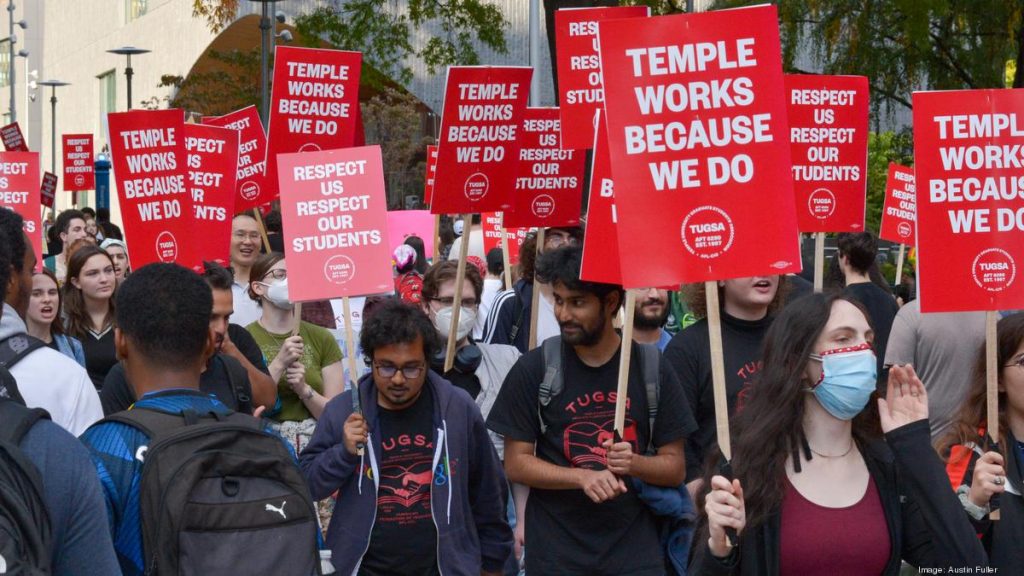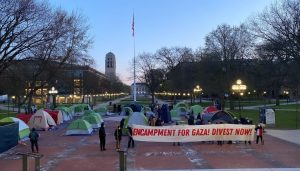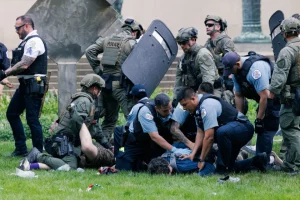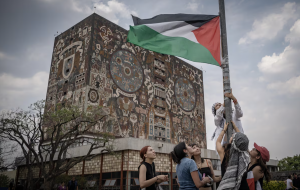Some details have been altered or omitted to preserve the anonymity of the writer.
I’m a graduate student in my fifth year in one of the STEM departments at Temple University. I kept up with the negotiations process since the beginning in January 2022, and I think our imagination for what a successful contract might look like was (successfully) whittled down by a year of horrendous offers from the university during the year preceding the strike. Reps from the university were constantly claiming that they were “happy” with the current collective bargaining agreement (CBA), which includes a measly 2.75% increase per year, 3-5 days of bereavement leave (depending on your relationship to the deceased family member), no healthcare contributions for dependents, and whenever the university budged slightly on some of these points, our union members celebrated. I don’t think celebration is a bad thing, but I worry that our bar for an acceptable contract was lowered by our already low expectation of what the Board of Trustees was willing to give us.
TUGSA’s proposal for wages was originally $38,000 (a living wage in Philadelphia), which was lowered to $32,000, and lowered again to around $28,000. Like many people, I originally thought the $38,000 number was outlandish and impossible, and maybe it was “impossible” given who we were up against, but I stopped thinking it was outlandish when I started to think about what a living wage actually looks like in Philly, and learned that our colleagues at the University of Pennsylvania just got a raise to a minimum fellowship of $38,000 per year.
It’s not just that we deserve a living wage because everyone deserves a living wage; we also deserve these wages because Temple has been exploiting our labor for as long as we’ve been teaching here! If I teach one section of a 40-student, four-credit course, my students pay well over $3,000 each to take my class (even higher if they are part-time or if they pay out-of-state tuition). That is over $120,000 in revenue I’ve made for the university in that semester. Our previous CBA gave us 8 percent of that, and under this newly ratified contract, I now receive 10% of that. It’s shameful how little the university is willing to pay instructional faculty over the millions they spend in superficial renovations and the exorbitant salaries of administration members.
Many of our union siblings were surprised to see this agreement. I was surprised to see that it was fully endorsed by our contract negotiations team (CNT). I saw the details of the contract after finding out about the endorsement, and I was underwhelmed. I think this is a good contract if you never believed you could receive a good contract. I think it is an insufficient contract if you know what you deserve.
There are good material gains that we won in the struggle: the tier system is gone (previously, TAs in the College of Arts and Humanities made $1,600 less than those in the College of Science and Technology), bereavement has increased to four days for everyone, parental leave has gone up 21 days instead of 10, and there is a new 25% subsidy for dependent healthcare. Annual wages increased to $24,000, $25,000, $26,000, and $27,000 for each year of the contract. But, I think the university knew exactly how little to offer in this contract to successfully placate us. If this were offered in week two of the strike, when morale was high, I think there would have been more of a “no” vote. I think we were exhausted, losing favor with the undergraduates, and were not able to get other on-campus unions like Temple Association of University Professors (TAUP) to break their fear of their anti-solidarity clauses and fight with us.
Striking union members were NOT given strike pay, and the contract is set to be effective Jan 2023 instead of Aug 2022, when the contract was due (meaning we don’t receive the retro pay from those five months). I think the university slid the rug out from under us, and I felt like I was in the Twilight Zone reading posts on social media of how excited people were about the announcement well before the bargaining unit even voted on the agreement. I felt the celebration of local Philly Democrats just from the announcement tweets that the CNT endorsed the tentative agreement (TA) particularly inappropriate considering most people in the bargaining unit didn’t even know what was in the agreement yet, let alone voted on it.
I originally didn’t realize how low voter turnout on this tentative agreement was; only 352 members of our over 700 member strong bargaining unit voted on the second tentative agreement. TUGSA leadership framed the vote on the first, forced tentative agreement in terms of percent voting yes and the voter turnout percentage, but only gave the flat numbers (344-8) of how many voted yes and no for the contract that passed. The low turnout could definitely signify apathy, but I’d also add that the TA was announced on Thursday night, and the voting meetings were two one-hour slots on Friday, a zoom session on Sunday, and two one-hour slots on Monday. And that was the tail end of spring break, so anyone who was traveling at the time would have a hard time voting.
Details of the first TA were sent out as an email to everyone in the bargaining unit, but the email announcing the second TA stated that we’d have to attend the voting meetings to see the details of the TA. So we didn’t even have time to really think about the contract in the first place before voting. I haven’t really discussed the contract with anyone outside my dept, but I know my entire department is pretty disgruntled about it.
I know TAUP is starting contract negotiations next semester, and the undergraduate workers in Temple University Undergraduate Workers Organizing Committee are trying to organize, and I hope our union members rally together with their struggles.










